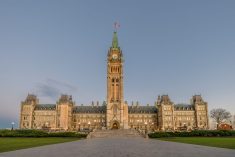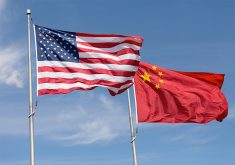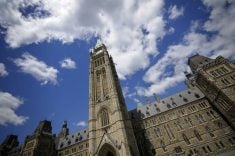Canada has won approval from the nine members of the Trans-Pacific Partnership trade negotiation to join the talks, prime minister Stephen Harper said today.
Canada could formally be invited to join the talks for a Pacific Rim trade liberalization deal this summer or autumn. The next TPP negotiations are in the United States in early July.
Harper announced agreement to have Canada join during a G20 leaders’ meeting in Mexico.
He said it would offer Canadian exporters better access to countries with more than 510 million people and economies worth more than $17 trillion.
Read Also

Nutrien tops profit estimates, launches review of phosphate business
Nutrien beat analysts’ expectations for third-quarter profit on Wednesday, and said it would initiate a review of strategic alternatives for its phosphate business.
“A TPP agreement will enhance trade in the Asia-Pacific region and will provide greater economic opportunity for Canadians and Canadian businesses,” he said in a statement issued from the G20.
Canada has been lobbying for months to join the TPP talks, currently involving the United States, Australia, Brunei, Chile, Malaysia, New Zealand, Peru, Singapore and Vietnam.
The U.S., Australia and New Zealand have signaled that they would not support Canada’s entry unless it agreed to negotiate a weakening of supply management protections.
In the House of Commons, Conservative MP Gerald Keddy, parliamentary secretary to trade minister Ed Fast, insisted Canada had accepted no pre-concessions to win a seat at the talks.
“The reality is that we did not give away anything to get to the table,” he said
Opposition MP Wayne Easter was not convinced.
The Liberal trade critic immediately demanded that Harper and the government reveal if any deals were made as the price of entry.
“Can the Conservative government give Canadians assurance that our supply management system will be preserved under this new agreement?” he asked in a statement.
Dairy Farmers of Canada quickly said it trusts the government to protect dairy farmers’ interests.
“The Canadian government has successfully concluded several trade deals and maintained supply management,” DFC said in a statement. “We expect that the government will maintain its position to defend supply management in all international forums and bilateral trade negotiations.”
Agricultural export sectors, on the other hand, embraced the announcement.
The Canadian Meat Council, representing federally registered meat packers, said Canada will suffer if it is not in the talks.
“In the absence of Canadian membership in these critical negotiations, Canadian meat exports would have become progressively disadvantaged in the dynamic and growing trans-Pacific marketplace,” CMC executive director Jim Laws said in a statement. “The ultimate result would have been reduced competitiveness, lower investment and lost jobs in not only all segments of Canada’s highly integrated livestock and meat chain … but also within the many companies that provide inputs to each link of the chain.”
Pork and cattle sectors, as well as Grain Growers of Canada, also issued statements of support.
GGC president Stephen Vandervalk said in a statement it is a “great opportunity” for Canadian farmers. “We can expand access for our canola, pulses, soybeans, malt barley and wheat for both whole grains and value-added products.”














